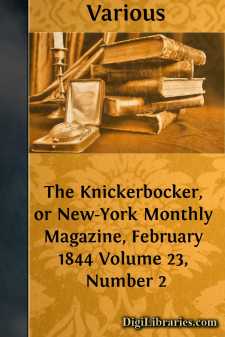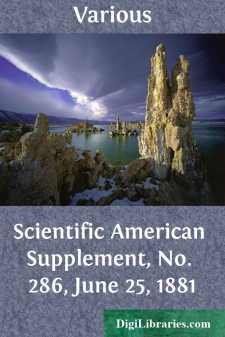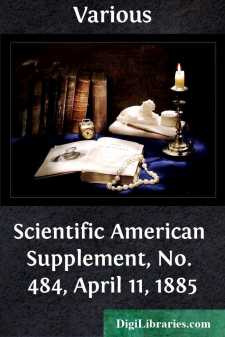Categories
- Antiques & Collectibles 13
- Architecture 36
- Art 48
- Bibles 22
- Biography & Autobiography 813
- Body, Mind & Spirit 142
- Business & Economics 28
- Children's Books 14
- Children's Fiction 11
- Computers 4
- Cooking 94
- Crafts & Hobbies 4
- Drama 346
- Education 46
- Family & Relationships 57
- Fiction 11828
- Games 19
- Gardening 17
- Health & Fitness 34
- History 1377
- House & Home 1
- Humor 147
- Juvenile Fiction 1873
- Juvenile Nonfiction 202
- Language Arts & Disciplines 88
- Law 16
- Literary Collections 686
- Literary Criticism 179
- Mathematics 13
- Medical 41
- Music 40
- Nature 179
- Non-Classifiable 1768
- Performing Arts 7
- Periodicals 1453
- Philosophy 64
- Photography 2
- Poetry 896
- Political Science 203
- Psychology 42
- Reference 154
- Religion 513
- Science 126
- Self-Help 84
- Social Science 81
- Sports & Recreation 34
- Study Aids 3
- Technology & Engineering 59
- Transportation 23
- Travel 463
- True Crime 29
The Knickerbocker, or New-York Monthly Magazine, February 1844 Volume 23, Number 2
by: Various
Description:
Excerpt
SICILIAN SCENERY AND ANTIQUITIES.
BY THOMAS COLE.
A few months only have elapsed since I travelled over the classic land of Sicily; and the impressions left on my mind by its picturesqueness, fertility, and the grandeur of its architectural remains, are more vivid, and fraught with more sublime associations, than any I received during my late sojourn in Europe. The pleasure of travelling, it seems to me, is chiefly experienced after the journey is over; when we can sit down by our own snug fire-side, free from all the fatigues and annoyances which are its usual concomitants; and, if our untravelled friends are with us, indulge in the comfortable and harmless vanity of describing the wonders and dangers of those distant lands, and like Goldsmith’s old soldier, ‘Shoulder the crutch and show how fields were won.’ I was about to remark, that those who travel only in books travel with much less discomfort, and perhaps enjoy as much, as those who travel in reality; but I fancy there are some of my young readers who would rather test the matter by their own experience, than by the inadequate descriptions which I have to offer them.
Sicily, as is well known, is the largest island in the Mediterranean Sea. It was anciently called Trinacria, from its triangular shape, and is about six hundred miles in circumference. Each of its extremities is terminated by a promontory, one of which was called by the ancients Lilybeum, and faces Africa; another called Pachynus, faces the Peloponessus of Greece; and the third, Pelorum, now Capo di Boco, faces Italy. The aspect of the country is very mountainous: some of the mountains are lofty; but towering above all, like an enthroned spirit, rises Ætna. His giant form can be seen from elevated grounds in the most remote parts of the island, and the mariner can discern his snowy crown more than a hundred miles. But Sicily abounds in luxuriant plains and charming valleys, and its soil is proverbially rich: it once bore the appellation of the Granary of Rome; and it is now said that if properly tilled it would produce more grain than any country of its size in the world. Its beauty and fertility were often celebrated by ancient bards, who described the sacred flocks and herds of Apollo on its delightful slopes. The plain of Enna, where Proserpine and her nymphs gathered flowers, was famous for delicious honey; and according to an ancient writer, hounds lost their scent when hunting, in consequence of the odoriferous flowers which perfumed the air; and this may be no fable; for in Spring, as I myself have seen, the flowers are abundant and fragrant beyond description; and it seemed to me that the gardens of Europe had been supplied with two-thirds of their choicest treasures from the wild stores of Sicily.
The history of Sicily is as varied and interesting as the features of its surface; but of this I must give only such a brief and hurried sketch as, to those who are not conversant with it, will serve to render the scenes I intend to describe more intelligible and interesting than they otherwise would be....












